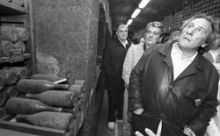Every year on June 15, the birth anniversary of one of Ukraine’s wine-making geniuses, Oleksandr Yehorov, the Massandra Winery in the Crimea celebrates its corporate holiday. This year’s celebration, however, were marred by problems relating not so much to viticulture as to the prospect that the Massandra Winery will be sold.
Even though the plan to sell the wine-making company is being meticulously camouflaged as an effort to upgrade the research and production process, experts in the field and above all the company’s director general, Mykola Boiko, see what’s in the offing only too clearly. Boiko has sent a letter to President Viktor Yushchenko, asking him to ban the sale, for this will be an irretrievable loss. The far- reaching plans of this “reform” are apparent: the complex has been divided into 10 independent parts to drive it into bankruptcy and then sold piece by piece.
The Massandra Winery was founded two centuries ago through the dedicated efforts of the Russian wine-maker Prince Lev Golitsyn and the support of the Russian tsar. Its current status dates from 1936, and since then it has won international acclaim. Massandra was among the first Soviet industrial enterprises to measure up to Sotheby’s auction rates. Today Massandra is a unique combination of research and production complexes whose value lies precisely in their unity, including unique vineyards in the Crimea, with its unmatched climatic conditions and experienced wine-making personnel, distinctive production capacities, and research potential.
Massandra’s wine cellars boast one million bottles, some of which cost hundreds of thousands of dollars, according to Sotheby experts. This cultural and historical treasure, as well as its economic effectiveness, will be lost if the complex is broken up, which is precisely what the Ministry of Agrarian and Industrial Policy of Ukraine has done.
There has never been a lack of characters wishing to grabitize Massandra. The winery effectively withstood the first attack during Meshkov’s rule, when it was exposed to the aggressive intentions of local “bandits.” Now the Ukrainian government, through its Ministry of Agrarian and Industrial Policy, is launching an attack on its own property, which may best described as the pride of the nation. The resolution signed by Minister Oleksandr Baranivsky reads: “We believe it expedient to support the matter of the further privatization of state-run enterprises of the wine- making industry.”
This conclusion is based on erroneous findings. After analyzing the state of the industry in which 10 out of 27 enterprises are in the red, the minister proposes to privatize even the most profitable ones. In the case of Massandra, the winery harvested 24,452 tons of grapes in 2005, 1.5 times more than in 2004. In one year, the output and sales of wines increased by five percent. Today Massandra produces more than 30 kinds of world-quality wines, including 63 percent slated for export and delivery to 10 countries. The company has shown the highest profitability rate in the industry: 12.8 percent. Last year its net profits reached 6.9 million hryvnias, and its annual tax payments to the central budget range between 12 and 13 million hryvnias. It is one of Yalta’s lucrative enterprises.
Massandra weathered a second attack not so long ago, after the company’s CEO, Mykola Boiko, complained to Prime Minister Yulia Tymoshenko about unjustified inspections (44 in one year) during a conference in Kyiv and after she instructed Deputy Prime Minister Anatoliy Kinakh to “check up on those who were doing the inspections” and put the situation to rights.
Now the attempts to break up the company have received a fresh impetus. Members of Ukraine’s parliament, whose powers officially ended recently, torpedoed a law on Massandra, aimed at preventing its breakup as a “solid property complex.” In February the Ministry of Agrarian and Industrial Policy adopted Massandra’s new statute dividing it into 10 “independent structures,” each as a separate business entity. In his letter to the president of Ukraine Boiko wrote that individual “independent” state enterprises are thus being propelled into bankruptcy and slated for privatized in a piecemeal fashion.
When Crimean journalists queried Minister Baranivsky about these allegations, he denied them, saying he had proposed to sell “some wine-making enterprises” to those who were already renting them. However, Mykola Holubiev, head of Reskomzem, the Crimea’s Republican Land Committee, held a press conference in Symferopil recently and declared that this reorganization does not simply mean getting Massandra prepared for sales. It means the loss of the association’s raw materials base.
According to Holubiev, in order to prevent Massandra’s privatization as an “entire complex,” President Leonid Kuchma granted it the unprivatizable status of “national association.” Certain businessmen, however, have found a way to bypass it not because they want to possess the unique winery — they want the coastal land. Now there is a real risk that the Massandra enterprise will be declared bankrupt and its coastal vineyards will be sold.
It is unlikely that the new owners will bother to renew plantations and sustain the thousand-year-old viticulture. They will uproot the vines and build resorts, hotels, and cottages in these unique spots of the Crimea to make money. Holubiev added that this is likely to happen because the land privatization paperwork is ready. The moratorium on land sales ends on Jan. 1, 2007, and there is little doubt that another attempt to sell Massandra will be made.
The association would then simply lose the world’s only raw materials base it has. It is irreplaceable because it is the basis of the quality of Crimean wines. As Lev Golitsyn once said, “Wine is a product of a given locality.” There is no other such place anywhere in the world.
Therefore, the residents of the Crimea and especially employees of Massandra are begging the president of Ukraine for help, seeing in him the last resort as the guarantor of the constitution. The big question is whether he will be able to help in this situation of anarchy and lawlessness.







